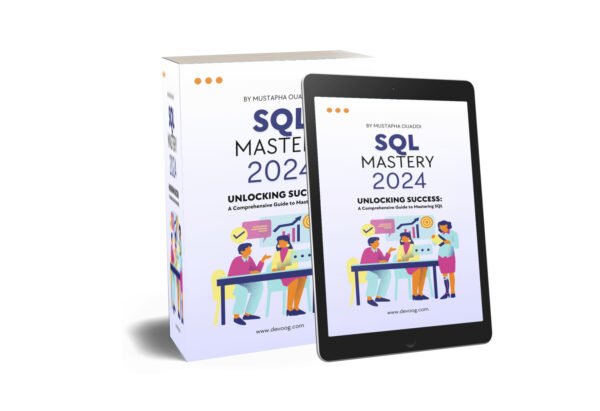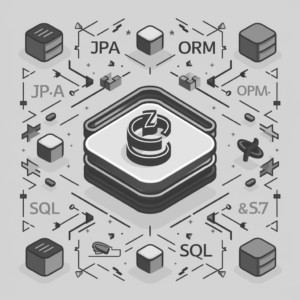SQL Mastery
“SQL Mastery” is a comprehensive guide that takes you from beginner to expert in SQL. With clear explanations, practical examples, and hands-on exercises, you’ll learn everything from basic syntax to advanced techniques, empowering you to build databases, manipulate data, and solve real-world problems with confidence.
Java is a powerful and versatile programming language that provides a wide array of advanced features to enhance the development process. This article delves into some of the key advanced Java concepts, including exception handling, the collections framework, generics, lambda expressions, the Stream API, the new date and time API, sealed classes, records, pattern matching, and text blocks.
1. Exception Handling
Exception handling in Java is a mechanism to handle runtime errors, ensuring the normal flow of the program. The main constructs for exception handling are try, catch, finally, and throw.
Example:
try {
int division = 10 / 0;
} catch (ArithmeticException e) {
System.out.println("Cannot divide by zero");
} finally {
System.out.println("This block always executes");
}
2. Collections Framework
The Java Collections Framework provides a set of interfaces and classes to store and manipulate groups of data as a single unit. It includes classes such as ArrayList, HashSet, HashMap, and more.
Example:
List<String> names = new ArrayList<>();
names.add("Alice");
names.add("Bob");
for (String name : names) {
System.out.println(name);
}
3. Generics
Generics enable types (classes and interfaces) to be parameters when defining classes, interfaces, and methods. This ensures type safety by allowing a compiler to catch invalid types.
Example:
public class Box<T> {
private T t;
public void set(T t) {
this.t = t;
}
public T get() {
return t;
}
public static void main(String[] args) {
Box<Integer> integerBox = new Box<>();
integerBox.set(10);
System.out.println(integerBox.get());
}
}
4. Lambda Expressions (Java 8)
Lambda expressions provide a clear and concise way to represent one method interface using an expression. They are used primarily to define inline implementations of functional interfaces.
Example:
List<String> names = Arrays.asList("Alice", "Bob", "Charlie");
names.forEach(name -> System.out.println(name));
5. Stream API (Java 8)
The Stream API provides a powerful way to process collections of objects. It supports functional-style operations on streams of elements, such as map-reduce transformations.
Example:
List<String> names = Arrays.asList("Alice", "Bob", "Charlie");
names.stream()
.filter(name -> name.startsWith("A"))
.forEach(System.out::println);
6. New Date and Time API (Java 8)
The new date and time API in Java 8 (in the java.time package) offers a comprehensive model for date and time manipulation.
Example:
LocalDate today = LocalDate.now();
LocalDate birthday = LocalDate.of(1990, Month.JANUARY, 1);
Period age = Period.between(birthday, today);
System.out.println("Age: " + age.getYears());
7. Sealed Classes (Java 17)
Sealed classes restrict which other classes or interfaces may extend or implement them. This provides more control over the class hierarchy.
Example:
public abstract sealed class Shape permits Circle, Rectangle {
}
public final class Circle extends Shape {
}
public final class Rectangle extends Shape {
}
8. Records (Java 17)
Records provide a compact syntax for declaring classes that are transparent carriers for immutable data. They are ideal for classes that primarily store data.
Example:
public record Point(int x, int y) {
}
public class Main {
public static void main(String[] args) {
Point point = new Point(1, 2);
System.out.println(point.x());
System.out.println(point.y());
}
}
9. Pattern Matching (Java 17)
Pattern matching simplifies the coding process by allowing more concise and readable code, especially when working with complex data structures.
Example:
public class PatternMatchingExample {
public static void main(String[] args) {
Object obj = "Hello, Java 17";
if (obj instanceof String s) {
System.out.println(s.toUpperCase());
}
}
}
10. Text Blocks (Java 17)
Text blocks simplify the inclusion of multiline string literals in code, enhancing readability and maintainability.
Example:
String textBlock = """
This is a text block.
It spans multiple lines.
""";
System.out.println(textBlock);
Conclusion
Advanced Java concepts enhance the language’s capabilities, making it more powerful and versatile. Understanding these concepts—exception handling, collections, generics, lambda expressions, the Stream API, the new date and time API, sealed classes, records, pattern matching, and text blocks—will help you write more efficient, readable, and maintainable code. As you continue to explore and master these advanced features, you’ll be better equipped to tackle complex programming challenges in Java.
#Java #AdvancedJava #JavaProgramming #ExceptionHandling #CollectionsFramework #Generics #LambdaExpressions #StreamAPI #DateTimeAPI #SealedClasses #Records #PatternMatching #TextBlocks #Java8 #Java17 #Coding #SoftwareDevelopment #Programming






